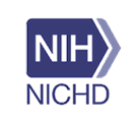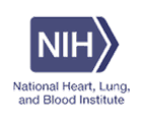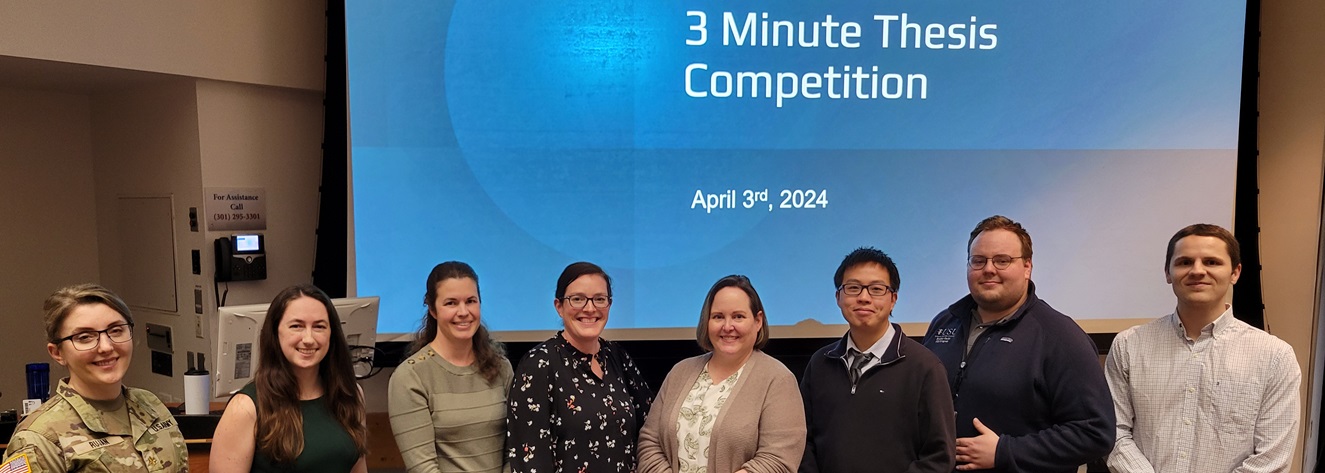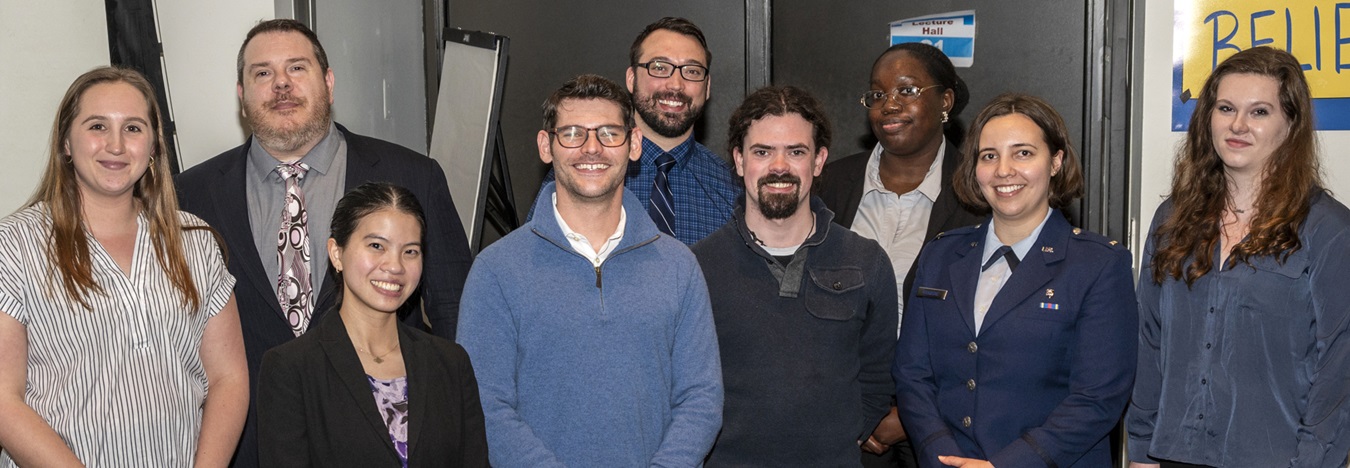WHAT WE DO
All major discoveries that underpin precision medicine come from the fields of Biochemistry and Molecular Biology. In the USU Department of Biochemistry and Molecular Biology, faculty are working on the molecular basis of devastating human diseases including neurodegenerative diseases, autoimmune diseases, infectious diseases, Post-Traumatic Stress Disorder (PTSD), neurodevelopmental disorders, infertility, and cancer. Our faculty are engaged in teaching graduate and medical students who conduct research and provide outstanding medical care in support of the military.
Our research activities, combined with our teaching activities, contribute to public health and DoD by uncovering and communicating knowledge necessary to understand human diseases including those suffered by members of the Uniformed Services.
RESOURCES
Recent News
Selected New publications
J Cell Sci. 2025 May 1;138(9):jcs263730. doi: 10.1242/jcs.263730. Epub 2025 May 9.PMID: 40302698
PLoS Biol. 2025 Apr 9;23(4):e3003084. doi: 10.1371/journal.pbio.3003084.
Please also see a nicely written article (by Sharon Holland) that highlights this work: https://www.dha.mil/News/2025/05/07/16/32/How-Your-Cells-Take-Out-the-Trash
Xiang X. Trends Cell Biol. (Spotlight) 2025 May;35(5):357-358. doi: 10.1016/j.tcb.2025.03.006.
Rodriguez-Martinez A, Young-Baird SK.(2025) Polysome profiling is an extensible tool for the analysis of bulk protein synthesis, ribosome biogenesis, and the specific steps in translation.
Mol Biol Cell. 2025 Apr 1;36(4):mr2. doi: 10.1091/mbc.E24-08-0341. Epub 2025 Mar 5. PMID: 40042939
Sara Young-Baird was featured as the corresponding author in ASCB Journal News.
Antioxidants (Basel). 2025 Jan 23;14(2):134. doi: 10.3390/antiox14020134.PMID: 40002321
J Biol Chem. 2024 Dec;300(12):107946. doi: 10.1016/j.jbc.2024.107946. Epub 2024 Oct 30.PMID: 39481601
Cell Rep. 2024 Nov 26;43(11):114943. doi: 10.1016/j.celrep.2024.114943. Epub 2024 Nov 1.PMID: 39487986
Biol Open. 2024 Nov 15;13(11):bio061697. doi: 10.1242/bio.061697. Epub 2024 Nov 25.PMID: 39588711
EMBO Rep. 2024 Jun 28. doi: 10.1038/s44319-024-00187-6. Online ahead of print
Roberts BS, Mitra D, Abishek S, Beher R, Satpute-Krishnan P. Mol Biol Cell. 2024 Mar 1;35(3):ar45. doi: 10.1091/mbc.E23-06-0257. Epub 2024 Jan 31.PMID: 38294851
Highlighted by MBoC and Prasanna Satpute-Krishnan is a featured corresponding author.
Stinson MW, Liu S, Laurenson AJ, Rotty JD.Mol Biol Cell. 2024 Feb 1;35(2):ar22. doi: 10.1091/mbc.E23-04-0137. Epub 2023 Dec 13.PMID: 38088893
Xu MJ, Jordan PW.Int J Mol Sci. 2024 Jan 12;25(2):952. doi: 10.3390/ijms25020952.PMID: 38256025
O'Brien MP, Pryzhkova MV, Lake EMR, Mandino F, Shen X, Karnik R, Atkins A, Xu MJ, Ji W, Konstantino M, Brueckner M, Ment LR, Khokha MK, Jordan PW.Int J Mol Sci. 2023 Dec 28;25(1):430. doi: 10.3390/ijms25010430.PMID: 38203602
Zhang J, Qiu R, Bieger BD, Oakley CE, Oakley BR, Egan MJ, Xiang X.Genetics. 2023 Dec 6;225(4):iyad169. doi: 10.1093/genetics/iyad169.PMID: 37724751
Competition for calnexin binding regulates secretion and turnover of misfolded GPI-anchored proteins
Cheatham AM, Sharma NR, Satpute-Krishnan P.J Cell Biol. 2023 Oct 2;222(10):e202108160. doi: 10.1083/jcb.202108160. Epub 2023 Sep 13.
Roberts BS, Satpute-Krishnan P. (2023)
The many hats of transmembrane emp24 domain protein TMED9 in secretory pathway homeostasis
Front Cell Dev Biol. 2023 Jan 16;10:1096899. doi: 10.3389/fcell.2022.1096899. eCollection 2022.
Liu P, Xie T, Wu X, Han G, Gupta SD, Zhang Z, Yue J, Dong F, Gable K, Niranjanakumari S, Li W, Wang L, Liu W, Yao R, Cahoon EB, Dunn TM, Gong X. Mechanism of sphingolipid homeostasis revealed by structural analysis of Arabidopsis SPT-ORM1 complex. Sci Adv. 2023 Mar 29;9(13):eadg0728. doi: 10.1126/sciadv.adg0728. Epub 2023 Mar 29.
Srivastava S, Shaked HM, Gable K, Gupta SD, Pan X, Somashekarappa N, Han G, Mohassel P, Gotkine M, Doney E, Goldenberg P, Tan QKG, Gong Y, Kleinstiver B, Wishart B, Cope H, Pires CB, Stutzman H, Spillmann RC; Undiagnosed Disease Network; Sadjadi R, Elpeleg O, Lee CH, Bellen HJ, Edvardson S, Eichler F, Dunn TM.
SPTSSA variants alter sphingolipid synthesis and cause a complex hereditary spastic paraplegia
Brain. 2023 Apr 19;146(4):1420-1435. doi: 10.1093/brain/awac460.
Pryzhkova MV, Boers R, Jordan PW. (2023) Modeling Human Gonad Development in Organoids.
Tissue Eng Regen Med. 2022 Dec;19(6):1185-1206. doi: 10.1007/s13770-022-00492-y. Epub 2022 Nov 9.
Qiu R, Zhang J, Xiang X.
J Cell Biol. 2023 Kinesin-1 autoinhibition facilitates the initiation of dynein cargo transport
Mar 6;222(3):e202205136. doi: 10.1083/jcb.202205136. Epub 2022 Dec 16.
Young-Baird SK. (2023) Pumping the brakes: A noncanonical RNA-binding domain in FMRP stalls elongating ribosomes.
J Biol Chem. 2023 Jan;299(1):102773. doi: 10.1016/j.jbc.2022.102773. Epub 2022 Dec 5.
Phan TP, Boatwright CA, Drown CG, Skinner MW, Strong MA, Jordan PW, Holland AJ (2022) Upstream open reading frames control PLK4 translation and centriole duplication in primordial germ cells. Genes Dev.
doi:10.1101/gad.349604.122
Guo Y, Chomiak AA, Hong Y, Lowe CC, Kopsidas CA, Chan WC, Andrade J, Pan H, Zhou X, Monuki ES, Feng Y (2022) Histone H2A ubiquitination resulting from Brap loss of function connects multiple aging hallmarks and accelerates neurodegeneration. iScience 25 (7):104519.
doi:10.1016/j.isci.2022.104519
Chomiak AA, Guo Y, Kopsidas CA, McDaniel DP, Lowe CC, Pan H, Zhou X, Zhou Q, Doughty ML, Feng Y (2022) Nde1 is required for heterochromatin compaction and stability in neocortical neurons. iScience 25 (6):104354.
doi:10.1016/j.isci.2022.104354
Saoji M, Petersen CE, Sen A, Tripoli BA, Smyth JT, Cox RT (2022) Reduction of Drosophila Mitochondrial RNase P in Skeletal and Heart Muscle Causes Muscle Degeneration, Cardiomyopathy, and Heart Arrhythmia. Front Cell Dev Biol 10:788516. doi:10.3389/fcell.2022.788516
Ronzier E, Laurenson AJ, Manickam R, Liu S, Saintilma IM, Schrock DC, Hammer JA, Rotty JD (2022) The Actin Cytoskeleton Responds to Inflammatory Cues and Alters Macrophage Activation. Cells 11 (11).
doi:10.3390/cells11111806
Qiu R, Zhang J, Rotty JD, Xiang X.(2021) Dynein activation in vivo is regulated by the nucleotide states of its AAA3 domain. Curr Biol. 31:4486-4498.e6. doi: 10.1016/j.cub.2021.07.081.
https://pubmed.ncbi.nlm.nih.gov/34428469/
Saoji M, Sen A, Cox RT (2021) Loss of Mitochondrial Ribonuclease P complex proteins differentially affect mitochondrial tRNA processing in vivo. International Journal of Molecular Sciences, 22(6066). https://www.ncbi.nlm.nih.gov/pmc/articles/PMC8200052/
Wang Y, Niu Y, Zhang Z, Gable K, Gupta SD, Somashekarappa N, Han G, Zhao H, Myasnikov AG, Kalathur RC, Dunn TM*, Lee CH*. (2021) Structural insights into the regulation of human serine palmitoyltransferase complexes. Nat Struct Mol Biol. 28::240-248 https://pubmed.ncbi.nlm.nih.gov/33558761/
Mohassel P. ……….Dunn TM*, Bönnemann CG* (2021) Childhood amyotrophic lateral sclerosis caused by excess sphingolipid synthesis. Nature Medicine 27:1197-1204
New grants
Philip Jordan got his R01 renewal (NIH/NIGMS) "Regulation of microtubule organizing centers during mammalian gametogenesis"
(2R01GM117155-11)
Sara Young-Baird got her new R35 from NIH/NIGMS "Regulation of protein synthesis during cellular stress"
(1R35GM157233-01)
Galina Petukhova got her new R21 from NIH "The Mouse Model System for Targeted Trimming of Disease Susceptibility Loci"
(1R21OD038406-01 )
Rachel Cox got her new R21 from the NIH "Identifying the radioprotective potential of radiation-resistent fungi using Drosophila" (1R21OD034471-01)
Philip Jordan got his new RO1 (NICHD/NIH) “Pluripotent stem cell-derived organoid model of human gonad development, functions, and disorders" (1R01HD114180-01)
Teresa Dunn got her CDMRP - DOD Amyotrophic Lateral Sclerosis Research Program (ALSRP) Therapeutic Development Award: “Targeting excessive Sphingolipid Synthesis for Treatment of ALS”
recent activities
The 3 Minute Thesis (3MT) competition is an event held at universities globally, and has occurred annually at USU since 2018. In the competition, senior level graduate students present their thesis work in 3 minutes with one static PowerPoint slide to a panel of judges with non-scientific backgrounds. The goal of 3MT is to promote training in effective scientific communication, an invaluable skill for our graduate students’ careers.
USU’s 3MT competition is organized by a planning committee consisting of graduate students and faculty advisors. This year’s planning committee was heavily composed of members from BIO, including graduate students Summer Paulson (second from left) and Anthony Erb (first from right). Summer, who also served as the planning committee chair, Anthony, and the additional students on the committee organized scientific communication workshops, practice sessions, and the competition itself. Anthony’s mentor and an additional BIO representative, Dr. Sara Young-Baird (fourth from left), serves as one of the faculty advisors to the planning committee.
BIO also had unparalleled representation within the competition itself, comprising a third of this year’s competitors. Participating BIO graduate students were 3rd year student Alex Graninger (first from right) and 5th years Matthew Gillen (fourth from right) and Robert Volpe (second from left). Congratulations to this year’s 3MT planning committee and the competitors on an impressive showcase of the unique research conducted here at USU!
USU 3MT 2024 Competitors:
Chris Bouslog
- Title: Rescuing Glymphatic Flow with Noradrenergic Inhibition after TBI
- Graduate Program: Neuroscience
- Advisor: Dr. Zygmunt Galdzicki
- Department: APG – Anatomy, Physiology, and Genetics
Marina Wylie
- Title: Hp genetics: It’s complicated
- Graduate Program: Emerging Infectious Diseases
- Advisors: Dr. Scott Merrell and Dr. Angela Melton-Celsa
- Department: MIC – Microbiology and Immunology
Mydirah Littlepage-Saunders
- Title: Pre-exposure to stressors increase likeliness of developing PTSD
- Graduate Program: Neuroscience
- Advisor: Dr. John Wu
- Department: GSO – Gynecologic Surgery and Obstetrics
Alex Graninger
- Title: Alzheimer’s Disease: When “I Don’t Remember” Becomes a Reality
- Graduate Program: Neuroscience
- Advisor: Dr. Prasanna Satpute-Krishnan
- Department: BIO – Biochemistry
Marana Rekedal
- Title: Predicting Virus Spillover for Pandemic Preparedness
- Graduate Program: Emerging Infectious Diseases
- Advisor: Dr. Eric Laing
- Department: MIC – Microbiology and Immunology
Cecelia Mangione
- Title: A Journey to SMAville
- Graduate Program: Molecular and Cellular Biology; MD/PhD
- Advisor: Dr. Thomas Flagg
- Department: APG – Anatomy, Physiology, and Genetics
Matthew Gillen
- Title: Manipulating Motors with Milton
- Graduate Program: Molecular and Cellular Biology
- Advisor: Dr. Rachel Cox
- Department: BIO – Biochemistry
Robert Volpe
- Title: Mushrooms vs Mushrooms
- Graduate Program: Molecular and Cellular Biology
- Advisor: Dr. Rachel Cox
- Department: BIO – Biochemistry
Harrison Rudd
- Title: The Exosome Express: Pancreatic Cancer's Deadly Delivery System
- Graduate Program: Molecular and Cellular Biology
- Advisor: Dr. Geeta Upadhyay
- Department: PAT – Pathology
Some of Our Partners




